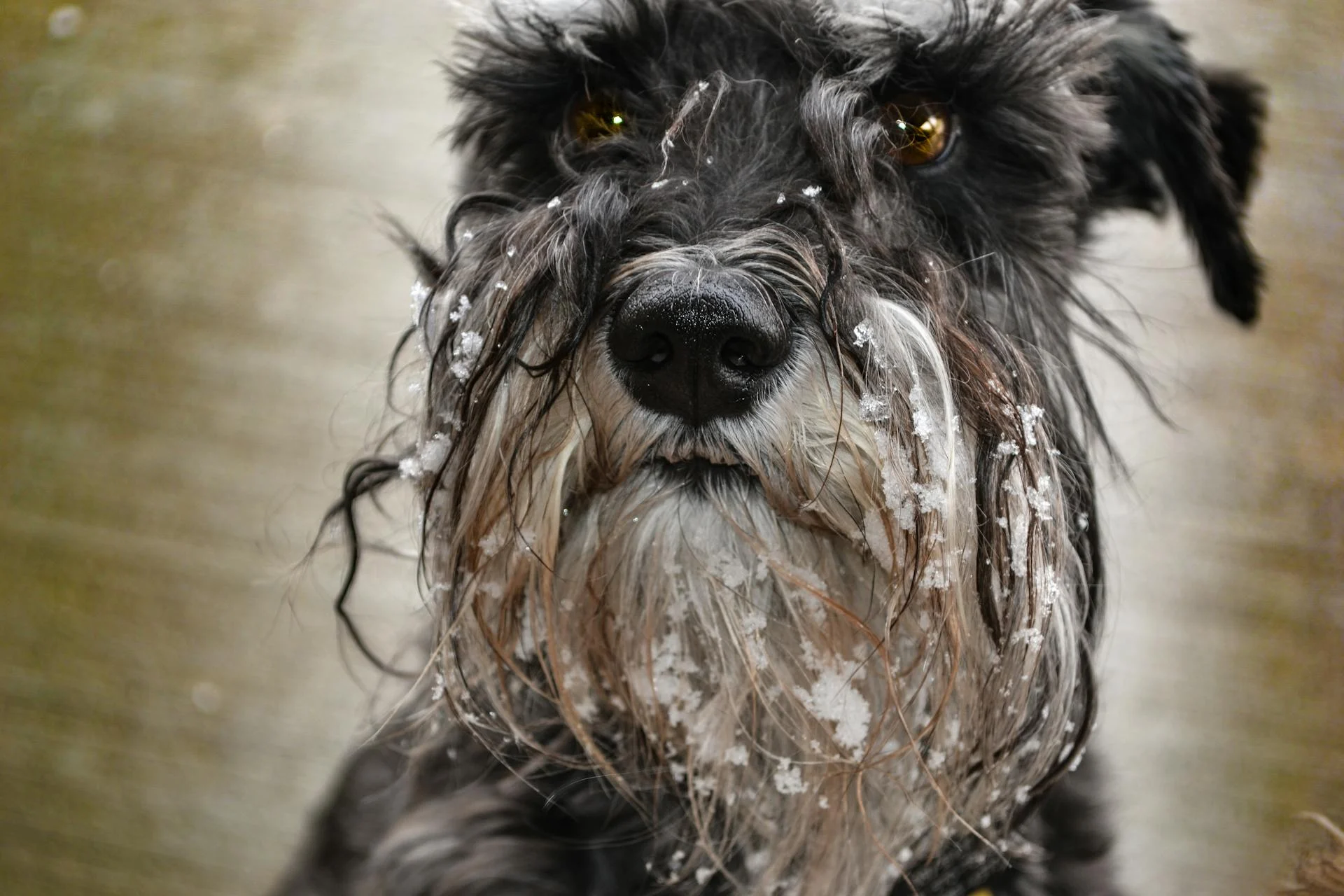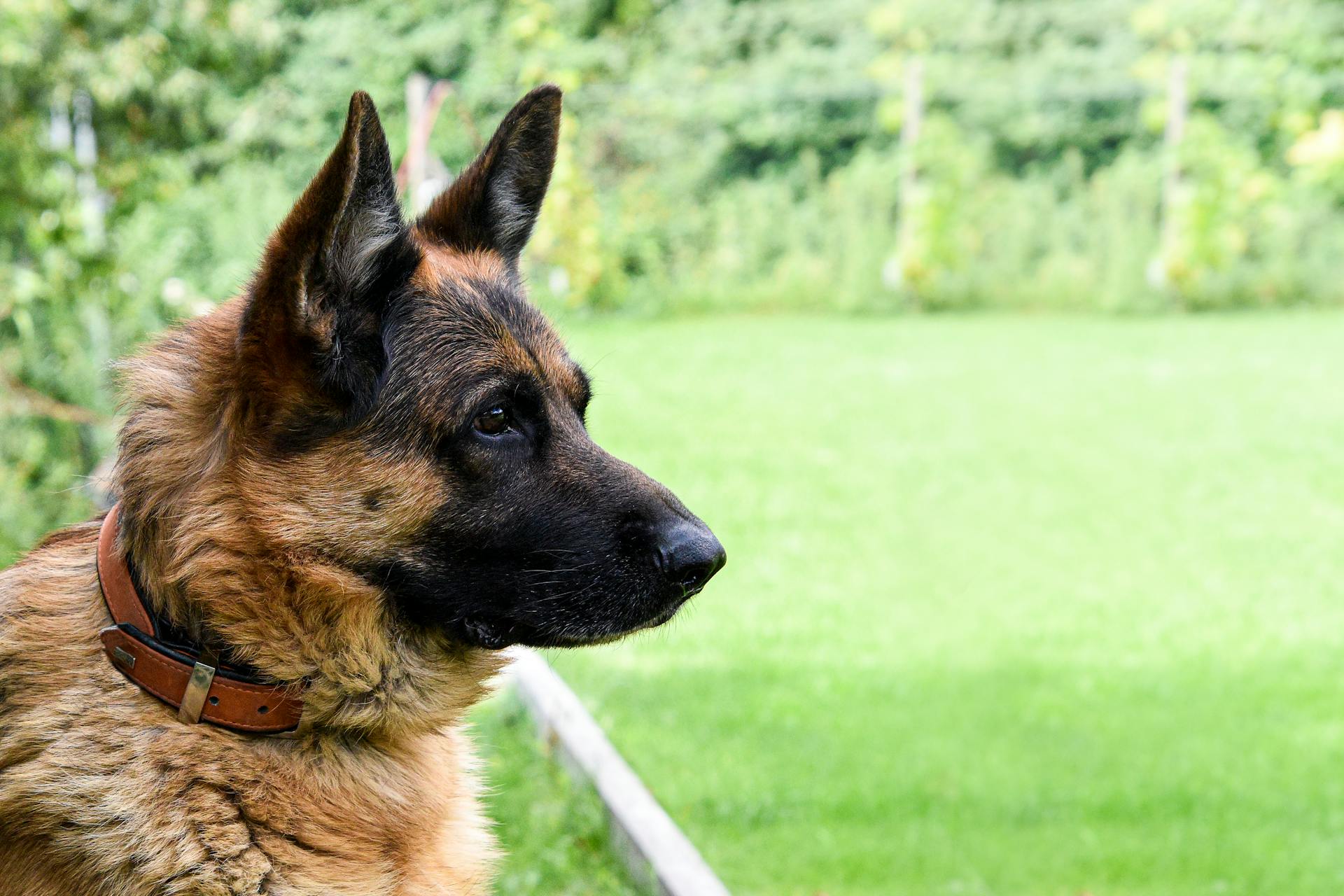
The King Shepherd is a majestic breed that requires attention to detail when it comes to care and ownership. They are a rare and ancient breed, with a history dating back to the 1920s.
Their thick double coat sheds heavily, especially during shedding season, which typically occurs in spring and fall. This means regular grooming is essential to prevent matting and tangling.
King Shepherds are highly intelligent and trainable, but they can be strong-willed and independent. Consistent, positive reinforcement training is recommended from an early age.
They thrive on physical and mental stimulation, so regular exercise and engaging activities are a must. A daily walk and playtime are essential for their physical health, while puzzle toys and obedience training can satisfy their mental needs.
Suggestion: Mixed Breeds Dogs
Breed Characteristics
King Shepherds are a unique breed that can make fantastic pets, but they do come with some specific characteristics.
They're generally suited for active families who are looking for a healthier German Shepherd alternative.
King Shepherds are known for being loyal and loving, making them great companions.
Their intelligence and ease of trainability make them a popular choice for many dog owners.
However, they can be high-maintenance and clingy, requiring a lot of attention and interaction.
Their unpredictable mix of German Shepherd DNA and other breeds, such as Alaskan Malamutes or Great Pyrenees, means you never quite know what you'll get.
Care and Maintenance
To keep your King Shepherd's coat looking its best, brushing several times a week is essential. This will help remove dead hair and control their moderate year-round shedding.
You'll also need to examine their ears regularly to avoid infections. Check their ears daily for dirt, debris, or damage and clean them as recommended by your vet. Their teeth should be cleaned on a weekly basis at the minimum, and their nails should be checked for excessive length monthly.
A high-quality food and regular exercise are also crucial for your King Shepherd's overall health. They need at least 60 to 90 minutes of walking or hiking per day to stay fit, and their weight should be monitored to prevent weight gain.
Health and Conditions
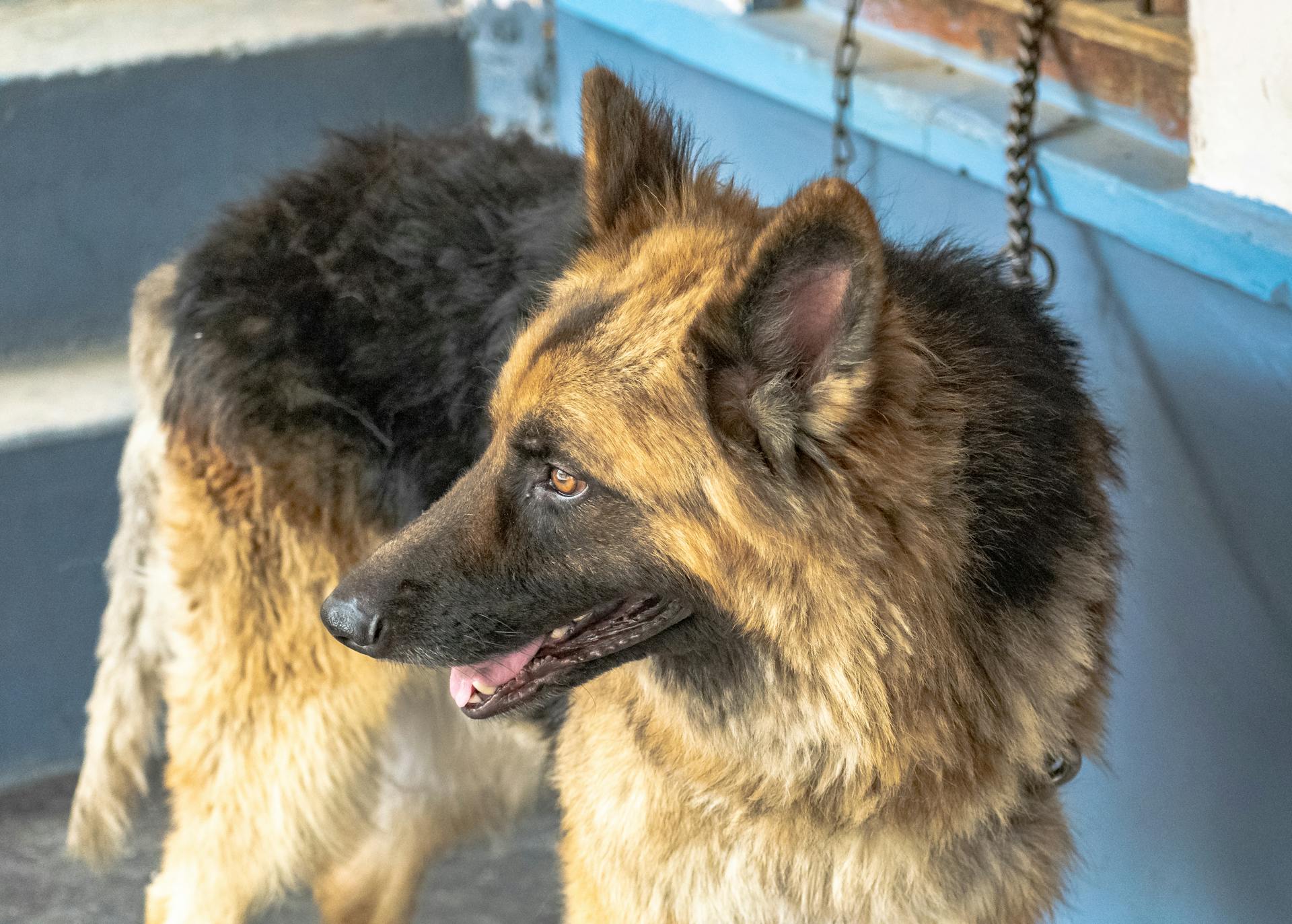
King Shepherds are generally healthy dogs, but like any breed, they can be prone to certain health issues. They can live up to 11 years on average with proper care.
One of the most common health issues in King Shepherds is hip and joint dysplasia, which can lead to pain and arthritis. This is especially true for large and giant breeds like the King Shepherd.
To prevent or manage joint dysplasia, it's essential to keep your King Shepherd at a healthy weight through regular exercise and a balanced diet. You should also consider scheduling regular veterinary checkups to detect any potential issues early.
King Shepherds are also prone to allergies, which can manifest as skin irritations, digestive issues, or respiratory problems. Identifying and managing the allergen is crucial for treatment.
Bloat is another serious health issue that can affect King Shepherds. This condition occurs when the stomach fills with gas and can twist on itself, restricting blood flow and potentially leading to life-threatening complications. Immediate veterinary attention is essential if you suspect bloat.
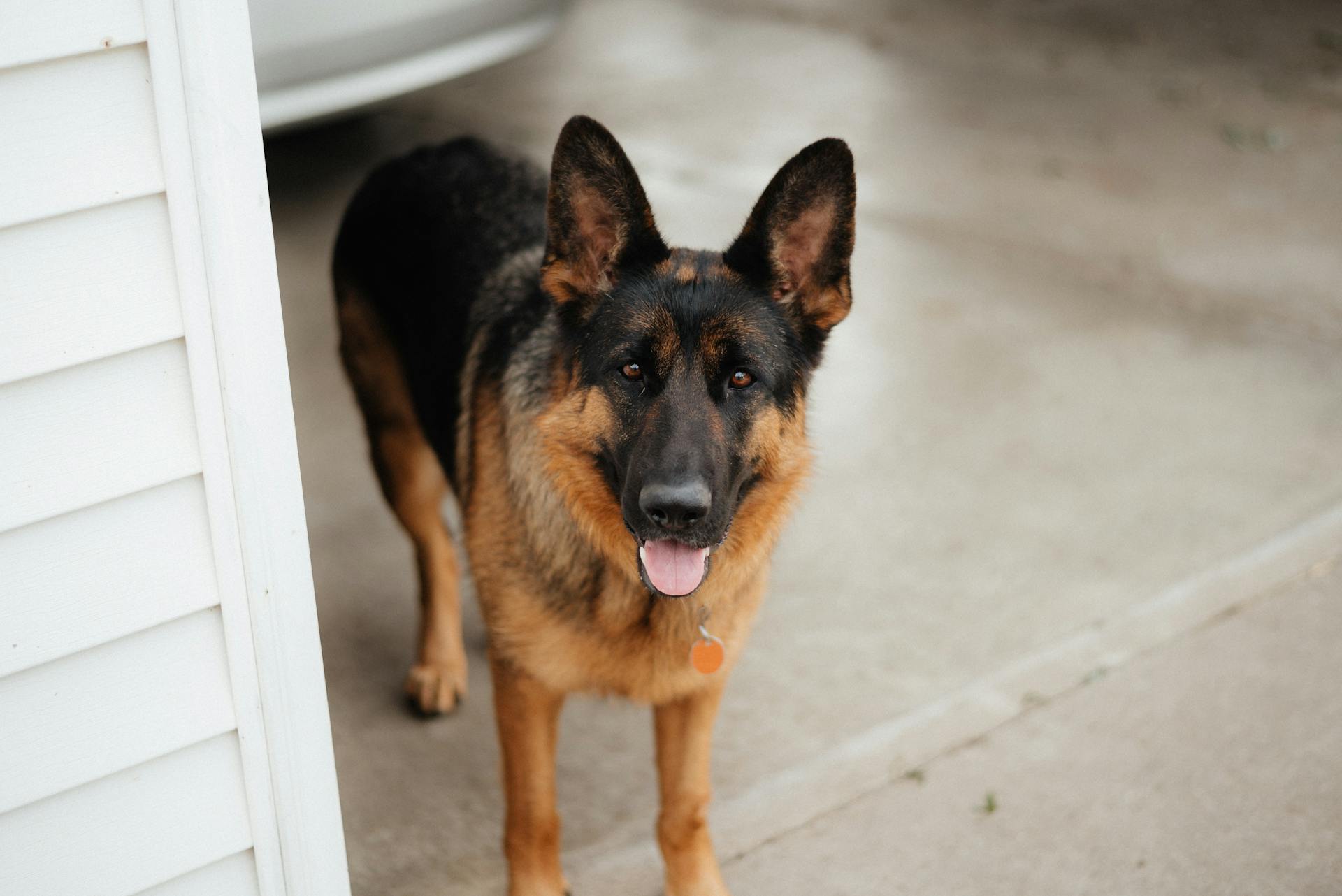
Here are some common health issues that King Shepherds may face:
- Hip and elbow dysplasia
- Allergies
- Bloat (GDV)
- Hypothyroidism
- Eye conditions
Regular veterinary checkups and preventative care can help prevent or manage these health issues. By being aware of these potential health risks and taking proactive steps, you can help your King Shepherd live a long and healthy life.
Grooming Needs
Grooming your King Shepherd regularly is essential to prevent matting and tangling of their coat, which can be painful for them. Brushing your dog several times a week will help remove dead hair and control shedding.
Their thick, weather-resistant coat sheds moderately year-round and more heavily during seasonal changes, requiring daily brushing to manage. You'll want to brush them at least daily during these times to prevent excessive shedding.
Checking their ears on a regular basis is crucial to prevent infections from taking hold. Dirt, debris, or damage can accumulate, so make it a habit to examine their ears regularly.
Cleaning their teeth is also vital for their oral health. Brush their teeth a minimum of three times per week, as recommended by your veterinarian.
You'll need to trim their nails before they get too long, usually once or twice a month. This will prevent them from clicking against the floor and causing discomfort.
Exercise
Exercise is a must for King Shepherds, with a daily hour to an hour and a half of walking or jogging required to maintain their physique.
These dogs are built for strength and endurance, so they need plenty of physical stimulation to keep them happy and healthy.
To tire them out, plan on spending at least an hour a day on activities like brisk walks, playing fetch, or working on obedience training.
Mental stimulation is just as important as physical exercise, so don't forget to provide obedience work, agility training, puzzle toys, or games like hide-and-seek to keep their brains engaged.
If you live in an apartment, don't worry – you can still give your King Shepherd all the exercise they need, you just have to be more creative and find ways to get them running, jumping, and acting goofy.
With a big backyard, you'll be at an advantage, but even without one, you can still provide plenty of exercise by taking them to a nearby park or finding other outdoor spaces to explore.
With Children & Pets
King Shepherds are a popular breed due to their loving nature with children and other pets. They are patient and sweet with kids, making them a great addition to families.
Early socialization is key to developing a social dog, and King Shepherds are no exception. They can be extremely gentle when socialized at an early age and exposed to small children and animals.
You should never leave your dog unsupervised with small children, regardless of breed. King Shepherds are no exception, and it's essential to supervise interactions between dogs and young children to prevent any biting or ear or tail pulling.
Related reading: King Shepherd Dog Breed Profile
King Shepherds can get along well with cats, but it's always better if they've been raised with them. They tend to be open to meeting new friends, including other pets, as long as you offer proper socialization from the start.
King Shepherds are generally welcoming to other dogs, and they can be surprisingly gentle and accommodating with smaller playmates. However, it's essential to socialize them as soon as you bring them home, including introducing them to other dogs, cats, and other animals.
Training and Behavior
King Shepherds are highly trainable, making them one of the easiest breeds to train. They thrive on positive reinforcement and are eager to please.
Their intelligence and quick wits make them a highly trainable canine, and they can be extremely successful in many training endeavors. However, proper socialization is crucial, especially in unfamiliar settings.
Teaching basic commands like sit, stay, and leave it is essential, and reinforcing them consistently is key. Socialization is equally important, and exposing your puppy to various places and situations can help them become comfortable in new environments.
King Shepherds are naturally protective of their families and home, but they can be friendly with non-threatening individuals. Early socialization can help them understand friendly interactions and know what a true threat looks like.
These dogs have a great deal of stamina, strength, and agility, making them suited for working as guard dogs, herding livestock, or even therapy dogs. However, they can be boisterous and strong, requiring training on how to walk on a leash.
With their loving and patient nature, King Shepherds can make perfect family pets. They're not as energetic as some breeds, but they do need daily exercise to expel their energy and prevent boredom.
King Shepherds are renowned for their even and loving disposition, and they love to cuddle up next to their owners. However, if they don't receive enough stimulation, they can make their own entertainment, which may include chewing up furniture or escaping from a fenced backyard.
Their intelligence can work against them if they're not trained or provided with enough mental and physical stimulation. But with proper training and socialization, King Shepherds can be wonderful and goofy companions for any family.
Finding and Owning
Locating a responsible King Shepherd breeder is crucial for getting a healthy puppy. You can find breeders through internet search or by contacting breed clubs that prioritize responsible breeding.
To ensure you're getting a healthy puppy, ask your breeder about medical documentation and paperwork. A reputable breeder will have proof that their puppies and parents are clear of medical conditions.
Once you've found a breeder, consider the similarities between raising a King Shepherd and any other puppy. They require similar care and attention, but it's always a good idea to be prepared for any unique needs your King Shepherd may have.
Breed History
The King Shepherd breed has a fascinating history. It was developed in the early 1990s by Shelley Watts-Cross and David Turkheimer in the United States.
These breeders aimed to create a dog with the working ability and protective instinct of the German Shepherd, but larger and with fewer health problems. They also wanted a friendlier disposition.
The King Shepherd is a hybrid breed, combining German Shepherds with other breeds like Great Pyrenees, Alaskan Malamutes, and sometimes Akita. This mix of breeds was intended to create a dog similar in nature and appearance to the German Shepherd.
The breed is still considered to be in development, which means it's not yet recognized by major kennel clubs. However, it can be registered with organizations like the American Rare Breed Association and the American King Shepherd Club.
Here's a list of some of the organizations that currently recognize the King Shepherd breed:
- American Rare Breed Association (ARBA)
- American King Shepherd Club (AKSC)
- American Pet Registry, Inc. (APRI)
- Dog Registry of America, Inc. (DRA)
- Eastern Rare Breed Dog Club (ERBDC)
- States Kennel Club (SKC)
- World Wide Kennel Club (WWKC)
The King Shepherd is a rare breed, and its development is still ongoing.
Finding a Breeder
Finding a breeder is a crucial step in bringing a new furry friend home. You can locate King Shepherd breeders in your area using the internet's search function.
The breed clubs mentioned can also assist you in finding a responsible breeder who prioritizes the animal's health and temperament. Make sure to ask the right questions when finding a breeder.
It's essential to ensure your breeder of choice has the animal's best interest at heart. Be prepared to ask about medical claims and documentation.
Any medical claims should be backed up with actual documentation and medical paperwork. This proves that the breeder has taken steps to ensure the puppy's health.
Clear documentation is a sign of a responsible breeder.
Owning Essentials
Owning a King Shepherd requires a significant commitment of time and energy. They need plenty of exercise to stay happy and healthy, so be prepared for long walks, playtime, and plenty of opportunities for your dog to burn off steam.
If you live in a small space without a yard, a King Shepherd is probably not the right dog for you. These dogs need room to roam and exercise, so a house with a yard is essential.
You'll also need to brush your King Shepherd several times a week to prevent matting and tangling of their fur. This is a big dog with a thick coat, after all!
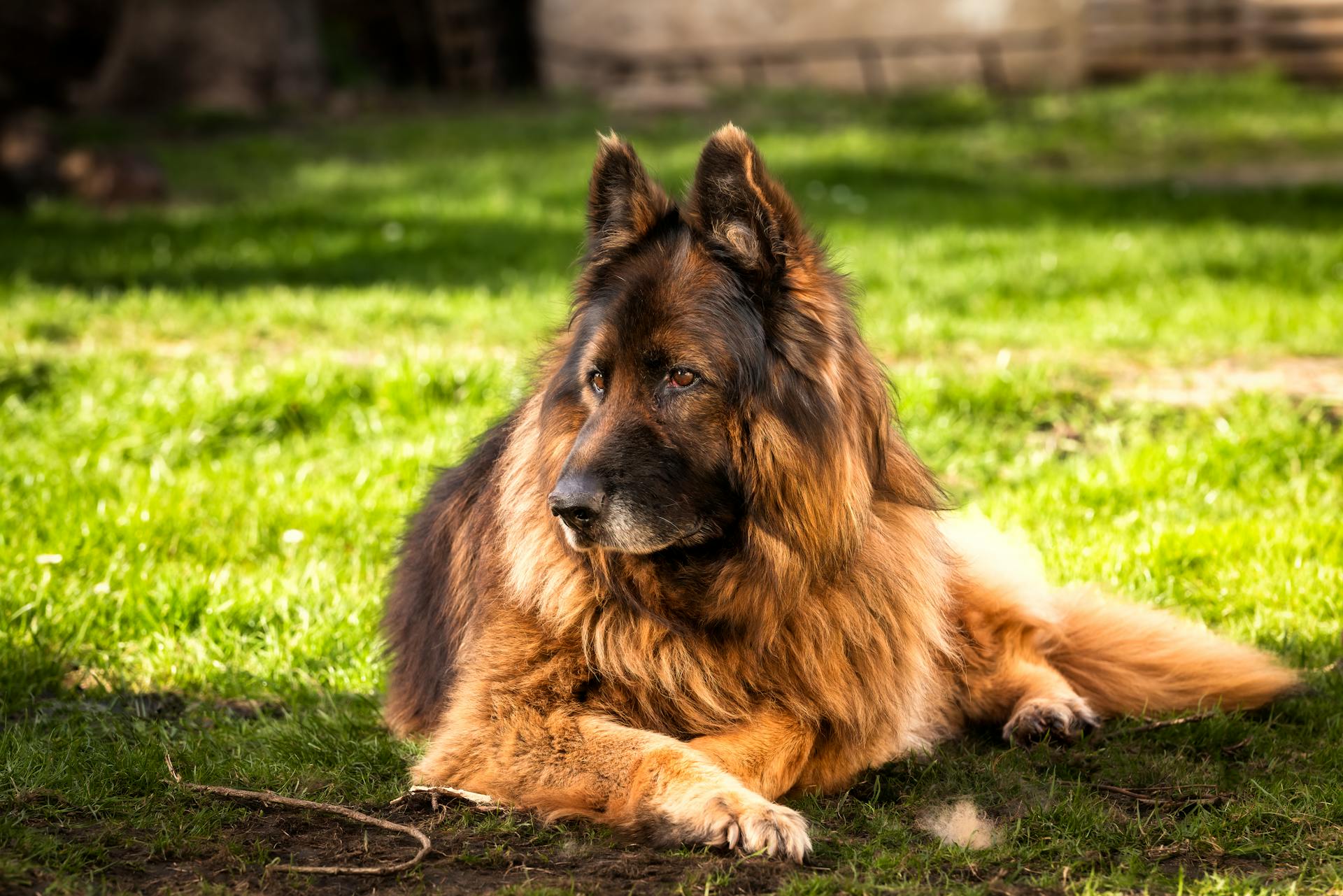
King Shepherds are loyal and loving, but they can be high-maintenance. They need regular training and socialization to ensure they grow into well-adjusted adult dogs.
Here are some key things to consider when owning a King Shepherd:
Remember, with the right care and attention, a King Shepherd can make a wonderful and loving companion.
Is a Dog Right for You?
Choosing the right pet can be a daunting task. It's essential to consider whether a dog is the right fit for you and your family.
Choosing the best breed for your family can be challenging, leading you to wonder if you are making the right choice. This is especially true when considering the needs and lifestyle of all household members.
Dogs require regular exercise, which can be a significant commitment. If you're an active person, a dog might be a great match, but if you have a sedentary lifestyle, it may not be the best choice.
Choosing the right breed for your family can be challenging, leading you to wonder if you are making the right choice.
Frequently Asked Questions
What is the difference between a German Shepherd and a king shepherd?
King Shepherds are generally larger and thicker than German Shepherds, making them a distinct variation of the breed. This size difference is one of the most notable distinctions between the two.
Are King Shepherds bigger than Shiloh shepherds?
No, King Shepherds are generally the same size as Shiloh Shepherds, with Kings being slightly shorter but heavier on average.
How to tell if your dog is a king shepherd?
To identify a King Shepherd, look for medium-sized, high-set ears that are thick, pointed, and carried erect with a wide base. Check the ears' firm feeling and forward positioning for a confident match.
What two dogs make a King Shepherd?
The King Shepherd is primarily a mix of the German Shepherd and the Shiloh Shepherd.
How rare is a King Shepherd?
The King Shepherd is a relatively rare breed, recognized by smaller organizations but not yet by the American Kennel Club. Its rarity makes it a unique and sought-after companion for those interested in this majestic breed.
Featured Images: pexels.com
